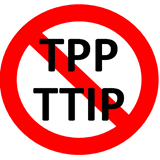TPP and TTIP: Partners in crime

Rosa Luxembourg Stiftung - NY Office | 23 January 2015
TPP And TTIP: Partners in crime
Fighting the corporate “trade” agenda in the United States
by Mike Dolan
January 2015
– FULL TEXT (English)
– FULL TEXT (German)
With the rise of the so-called BRICS countries—Brazil, Russia, India, China, and South Africa—global capitalism has entered a new stage. For centuries Europe and the United States have dominated the world, but now the economic center of gravity may slowly be shifting from the West and the North to the East and the South. While it is too soon to say with any certainty what this means for global power relations, we are indeed witnessing a substantial change. In particular the economic rise of China, already leading the world in exports, is a harbinger of what is likely to come: the relative decline of the West and greater assertiveness from (some of) the BRICS and certain other countries in the global South.
The Western powers are not about to let such a tectonic shift in global power relations go unchallenged. They are trying to slow, if not stop, the trend in order to keep a firm grip on the world economy and protect their own interests. Most notably, Western (and in particular U.S.) policies toward China are dominated by a contemporary form of containment strategy.
In this context, the current negotiations around two large “trade agreements” have become a major instrument of the Western approach: along the Pacific Rim, the United States is negotiating a “Trans-Pacific Partnership” (TPP) with Australia, Brunei, Canada, Chile, Japan, Malaysia, Mexico, New Zealand, Peru, Singapore, and Vietnam. Across the Atlantic, the “Transatlantic Trade and Investment Partnership” (TTIP) between the U.S. and the European Union is taking shape.
To be sure, these proposals are a response to the failure to create a common market in the Americas and to advance further the economic agenda of the West via the World Trade Organization—failures that themselves resulted from the global power shifts that these agreements seek to halt. However—and this is key to understanding these proposals—they do not really focus on questions of trade; not even their proponents claim that they would have a significant impact on trade or boost economic growth. Rather, they are about preserving the West’s ability to set the standards for the world economy of the 21st century—designed to contain the rise of the BRICS, in particular China.
The United States Trade Representative is currently pushing hard for a quick passage of TPP and TTIP. And with the new, Republican-led Congress it seems feasible that the government will succeed in enlisting the support of a majority in both houses.
This outcome, however, is not set in stone, argues Mike Dolan, Vice-President of the Citizens’ Trade Campaign, a national coalition of environmental, labor, consumer, family farm, religious, and other civil society groups based in Washington, D.C. In this study, he takes stock of the resistance against both TPP and TTIP in the United States and outlines the strategy we need if we want to prevent the passage of “trade” agreements that threaten to kill jobs, undermine labor standards and environmental regulations, limit access to generic drugs, and even aim to exempt corporations from the judicial process. If we can stop “fast track” in Congress and create a debate about the details in the proposals, Dolan argues, neither TPP nor TTIP will pass. Let’s go for it!
– FULL TEXT (English)
– FULL TEXT (German)





